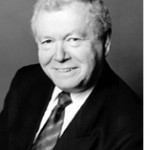By Rabbi Dow Marmur

JERUSALEM — Many years ago I attended a conference in Jerusalem at which the late Abba Eban was a speaker. At the end of his address he got a standing ovation. “Thank you,” he said, “normally I have to go abroad for this kind of reception.”
Something similar could be said about Shimon Peres. Though during his seven-year term as president of the State of Israel he became the face and the voice of his country, universally appreciated and honored, at home it was different, particularly during his long years in politics. Peres, the hardened politician who has played a pivotal role in Israeli public life throughout its history, was never really elected to high office. His spells as prime minister came about through circumstances and horse trading, not because the country had chosen him to be its leader.
Many reasons are given for this. Perhaps Abba Eban got it right. When asked why Peres didn’t keep a particular promise to him, Eban said: “Because he didn’t want to set a precedent.” People considered Peres manipulative and devious, though they never doubted his political skills. Many even acknowledged his great contribution to the country, especially to its defense.
After his recent stroke, Shimon Peres is now fighting for his life. Even Prime Minister Netanyahu, who in the past did all he could to keep Peres out of the presidency – his party promoted Moshe Katsav, who’s still in jail for rape, a proclivity that is said to have been known already long ago – has spoken warmly of him, even praying for his good health in his recent address to the UN General Assembly.
Indeed, we hope for many more years of having Shimon Peres with us as a man, as the symbol of Israeli continuity and, internationally, as the most appreciated public figure in his country.
He has spoken much about peace, but has he done enough about it? Yes, he was one of the architects of the Oslo Accord and, despite his less than cordial relations with the late Yitzhak Rabin (as revealed in their respective memoirs) he was his ally in the pursuit of peace. But, instead of being caught up in the nationalist euphoria after June 1967, as the acknowledged disciple of Ben Gurion should Peres have heeded the former’s urging in the wake of the Six Day War not to keep the territories? Would peace have become a reality without the settlements?
Prime Minister Netanyahu says, no. On one level he may not be wrong. The Palestinians appear to claim all the Land of Israel, Tel Aviv no less than the West Bank settlements, and their president even told the UN Assembly recently that he expects an apology from Britain for the Balfour Declaration almost a century ago.
On the other hand, serious exponents of the international community, including allies like the United States, repeatedly make the case that it’s the settlements and their continued expansion that make peace between Israel and the Palestinians well-nigh impossible. Had Peres been a visionary like his mentor Ben Gurion he may have proven this contention to be true enabling Israel and the Palestinians to face a very different and much better future than what has now become possible.
But perhaps it’s unfair to try to cast a seasoned politician into the role of a prophet. And hindsight may never be a legitimate criterion for judging statecraft.
*
Rabbi Marmur is spiritual leader emeritus of Holy Blossom Temple in Toronto. Now residing in Israel, he may be contacted via dow.marmur@sdjewishworld.com. Comments intended for publication in the space below MUST be accompanied by the letter writer’s first and last name and by his/ her city and state of residence (city and country for those outside the United States.)